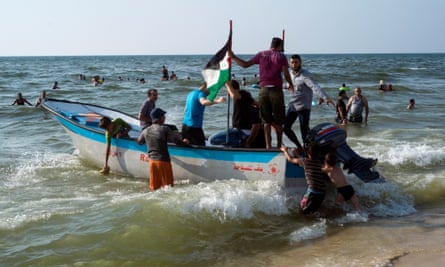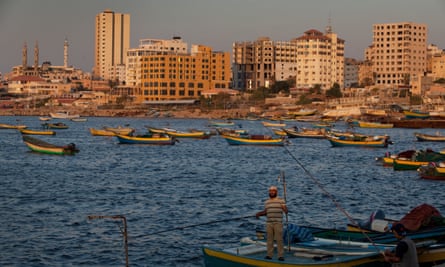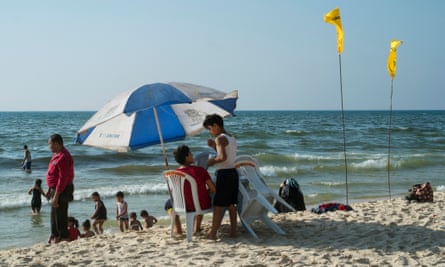It is high summer on Gaza City’s beach. A horse and cart patrols the shore selling brightly coloured swimming rings. A small boat is giving joy rides out to sea. Families sit on chairs while a few children play in the water.
Normally, in the midst of the school holidays, the beach would be crowded. Particularly this year, as an electricity crisis makes many homes unbearable during the heat. But these days many parents are keeping their children away.
The first hint is the smell: the sulphurous odour of raw sewage.
Where children are swimming the water is a murky brown, with a fine suspension of faecal matter visible to the naked eye. Small fish at the water’s edge, scooped out by the giggling children, are dead.
While pollution of Gaza’s 25 miles of beaches is not new, what is different is the degree. These days, according to the last environmental survey, 73% of Gaza’s coastline is dangerously polluted with sewage amid an energy crisis that is now also affecting Israel across the border wall, sharply up from 40-50% a year ago.
The reason is simple. After 10 years of an Israeli-led blockade that has seen Gaza’s impoverished urban infrastructure decay, the current decision by the Palestinian Authority under president Mahmoud Abbas to cut electricity to the coastal strip has impacted Gaza’s rudimentary sewage treatment.
Without electricity to power its lagoons, treatment works and sewage pumps, Gaza’s waste managers have been forced to make a choice, permit the cities to flood – or allow raw sewage to escape the overflows into the sea.
It is a new level of contamination that is not only having an environmental effect, but a profound social one too. In an overcrowded strip of land home to two million people, and largely cut off from the outside world, for many the beach and sea are the only affordable – and accessible – form of recreation.

Sitting in his wooden lifeguard’s tower, Khalid Farahat, who is employed by the local municipality, says he has seen the number of beach-goers drop by almost 50% since the electricity and sewage crisis began in April.
Today he is accompanied by his 12-year-old son who won’t go in the water when it is so dirty. “It is much less crowded than it was,” he explains.
“It is so polluted at the moment. There is a sewage pumping line less than a kilometre from here. When the wind blows in this direction the water is filthy. When there is electricity to power my loudspeaker I warn people to stay out of the water.
“I remember when we had electricity 24/7 people would still come here to escape the heat. But no beach and no electricity – that is a disaster for Gaza.”
The escalation of Gaza’s sewage problem is most obvious in two locations: in Wadi Gaza, at the centre of the strip, where an open river of almost pure effluent flows into the sea, and a second stream in Gaza’s north where sewage has been flowing via a wadi beneath the border wall into Israel and down into the sea around Zikkim beach.
At Gaza’s Coastal Municipalities Water and Utilities office, Omar Shatet, the head of operations, explains the growing problem.
“This is worst it has ever been. We rely on electricity to drive our systems. And with 20 hours a day without electricity we can’t pump sewage.
“We have five waste water treatment plants, but most of them were built originally as temporary, until we completed new sludge works. They were planned 15 years ago and only one is nearing completion.”

The catch 22 – as Shatet concedes – is that it will need power to operate. “We have 70 sewage lifting stations across Gaza,” he adds. “But the main priority right now is to stop flooding in cities when the pumps are working. That means that 15,000 metric tonnes of raw sewage is going into the sea as well as 110,000 tonnes that are partially treated.
“The result is that the last testing of beach water that was carried out showed 73% has a level of contamination that prohibits swimming which leaves only 27% available spread all over strip.”
Shatet himself has not swum in the sea himself in the last few years and would only consider swimming from a boat 200m beyond the coastline, where the pollution diminishes.
At the offices of Unicef, which runs a desalination plant, the UN organisation’s water and sanitation specialist, Mohanlal Peiris, gives an equally bleak account.
“It is very bad. I mean, it was already bad. Now it is worse. There is really no proper treatment works. And what’s been happening in the past has now been exacerbated because there is no power. And when there is no power in the lagoons there is no aeration for the treatment process.
“The treatment authority is facing a pretty hopeless choice in which Gaza getting flooded with sewage would be even more catastrophic. If that happens the sewage would get into a water table that is already getting brackish because infiltration of infiltration by sewage, fertilisers and sea water intrusion as the aquifers have become depleted.”

Gaza, as Peiris explains, also has unique challenges. Because it is flat stabilisation ponds for sewage cannot use gravity to separate the sludge, relying on electricity. The Israeli-led blockade means difficulties not only in sourcing generators but any hope of extending marine sewage outfalls from the water’s edge out to sea, as is the case in the UK where outfalls are often a mile long.
It is not only bathers who fear what is happening to the sea. Peiris’s colleague at Unicef, Milina Shahin, lives by the beach and is concerned about the impact of the odours on her own children.
“I live by the beach. It is supposed to be a privilege. But the smells give me a headache. Now I am concerned about my own children. But I can’t say don’t go to balcony. It’s supposed to be a nice thing – to see the sea. I paid money for the view but now it is a disaster,” she says.
And while for richer residents there are other options – including private pools and chalets that can be rented for 12 hours for around £80 – it represents roughly half the monthly salary of a lifeguard like Khalid, making it unavailable for most in Gaza.
A second option is to travel north to the mile-and-a-half of beach in Gaza’s north, immediately bordering Israel, where the water is regarded as the cleanest in the strip.
But, for most, the only option is to swim and even fish in the filthy water.
On the day the Guardian visits Gaza beach, Tayeb Quneitra, a hairdresser, is sitting by the water’s edge with his wife watching his children aged three to nine years old playing in the shallows.
He says he last came three weeks ago. “I heard on the news that it is not safe to swim because of the sewage. But the kids need to swim,” he says. “I am not a swimmer myself but I have friends who refuse to come.
“But this is the only place where you can come to escape the tedium of Gaza. And you get used to the smell. Last time we came was much worse than it is today,” he adds. “Then the water was completely green.”
Follow Guardian Cities on Twitter and Facebook to join the discussion, and explore our archive here
